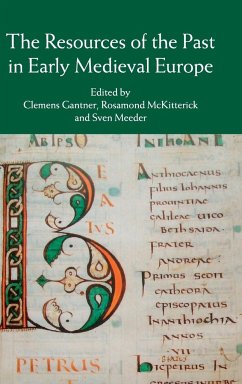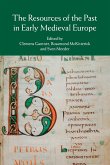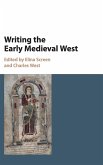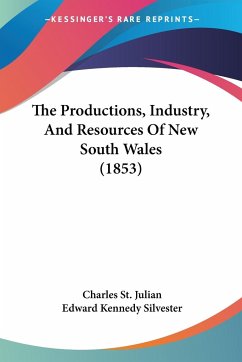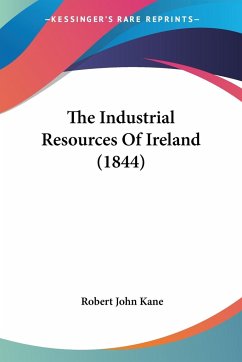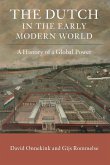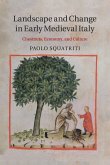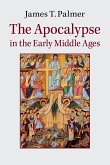The Resources of the Past in Early Medieval Europe
Herausgeber: Gantner, Clemens; Meeder, Sven; Mckitterick, Rosamond
The Resources of the Past in Early Medieval Europe
Herausgeber: Gantner, Clemens; Meeder, Sven; Mckitterick, Rosamond
- Gebundenes Buch
- Merkliste
- Auf die Merkliste
- Bewerten Bewerten
- Teilen
- Produkt teilen
- Produkterinnerung
- Produkterinnerung
This volume examines the use of the textual resources of the past to shape cultural memory in early medieval Europe.
Andere Kunden interessierten sich auch für
![The Resources of the Past in Early Medieval Europe The Resources of the Past in Early Medieval Europe]() The Resources of the Past in Early Medieval Europe35,99 €
The Resources of the Past in Early Medieval Europe35,99 €![Writing the Early Medieval West Writing the Early Medieval West]() Writing the Early Medieval West92,99 €
Writing the Early Medieval West92,99 €![The Productions, Industry, And Resources Of New South Wales (1853) The Productions, Industry, And Resources Of New South Wales (1853)]() Charles St. JulianThe Productions, Industry, And Resources Of New South Wales (1853)30,99 €
Charles St. JulianThe Productions, Industry, And Resources Of New South Wales (1853)30,99 €![The Industrial Resources Of Ireland (1844) The Industrial Resources Of Ireland (1844)]() Robert John KaneThe Industrial Resources Of Ireland (1844)37,99 €
Robert John KaneThe Industrial Resources Of Ireland (1844)37,99 €![The Dutch in the Early Modern World The Dutch in the Early Modern World]() David OnnekinkThe Dutch in the Early Modern World32,99 €
David OnnekinkThe Dutch in the Early Modern World32,99 €![Landscape and Change in Early Medieval Italy Landscape and Change in Early Medieval Italy]() Paolo SquatritiLandscape and Change in Early Medieval Italy31,99 €
Paolo SquatritiLandscape and Change in Early Medieval Italy31,99 €![The Apocalypse in the Early Middle Ages The Apocalypse in the Early Middle Ages]() James PalmerThe Apocalypse in the Early Middle Ages34,99 €
James PalmerThe Apocalypse in the Early Middle Ages34,99 €-
-
-
This volume examines the use of the textual resources of the past to shape cultural memory in early medieval Europe.
Hinweis: Dieser Artikel kann nur an eine deutsche Lieferadresse ausgeliefert werden.
Hinweis: Dieser Artikel kann nur an eine deutsche Lieferadresse ausgeliefert werden.
Produktdetails
- Produktdetails
- Verlag: Cambridge University Press
- Seitenzahl: 372
- Erscheinungstermin: 4. Januar 2016
- Englisch
- Abmessung: 235mm x 157mm x 25mm
- Gewicht: 689g
- ISBN-13: 9781107091719
- ISBN-10: 1107091713
- Artikelnr.: 41417181
- Herstellerkennzeichnung
- Libri GmbH
- Europaallee 1
- 36244 Bad Hersfeld
- gpsr@libri.de
- Verlag: Cambridge University Press
- Seitenzahl: 372
- Erscheinungstermin: 4. Januar 2016
- Englisch
- Abmessung: 235mm x 157mm x 25mm
- Gewicht: 689g
- ISBN-13: 9781107091719
- ISBN-10: 1107091713
- Artikelnr.: 41417181
- Herstellerkennzeichnung
- Libri GmbH
- Europaallee 1
- 36244 Bad Hersfeld
- gpsr@libri.de
Introduction: cultural memory and the resources of the past Walter Pohl and
Ian Wood; Part I. Learning Empire: 1. Creating cultural resources for
Carolingian rule: historians of the Christian empire Walter Pohl; 2.
Cassiodorus's Historia tripartita before the earliest extant manuscripts
Desirée Scholten; 3. Politics and penance: transformations in the
Carolingian perception of the conversion of Carloman (747) Erik Goosman; 4.
Lessons in leadership: Constantine and Theodosius in Frechulf of Lisieux's
Histories Graeme Ward; Part II. The Biblical Past: 5. Carolingian political
discourse and the biblical past: Hraban, Dhuoda, Radbert Mayke de Jong; 6.
Biblical past and canonical present: the case of the Collectio 400
capitulorum Sven Meeder; 7. Divine law and imperial rule: the Carolingian
reception of Junilius Africanus Marianne Pollheimer; 8. Framing Ambrose in
the resources of the past: the late antique and early medieval sources for
a Carolingian portrait of Ambrose Giorgia Vicino; Part III. Changing Senses
of the Other from the Fourth to the Eleventh Centuries: 9. Pagans, rebels
and Merovingians: otherness in the early Carolingian world Richard Broome;
10. Who are the Philistines? Bede's readings of Old Testament peoples Ian
Wood; 11. Gens perfida or populus Christianus? Saxon (in)fidelity in
Frankish historical writing Robert Flierman; 12. Fragmented identities:
otherness and authority in Adam of Bremen's History of the Archbishops of
Hamburg-Bremen Timothy Barnwell; Part IV. The Migration of Cultural
Traditions in Early Medieval Europe: 13. Transformations of the Roman past
and Roman identity in the early Middle Ages Rosamond McKitterick; 14. The
eighth-century papacy as cultural broker Clemens Gantner; 15.
Transformations of Late Antiquity: the writing and re-writing of church
history at the monastery of Lorsch, c.800 Helmut Reimitz; Conclusion Mayke
de Jong and Rosamond McKitterick; Bibliography; Index.
Ian Wood; Part I. Learning Empire: 1. Creating cultural resources for
Carolingian rule: historians of the Christian empire Walter Pohl; 2.
Cassiodorus's Historia tripartita before the earliest extant manuscripts
Desirée Scholten; 3. Politics and penance: transformations in the
Carolingian perception of the conversion of Carloman (747) Erik Goosman; 4.
Lessons in leadership: Constantine and Theodosius in Frechulf of Lisieux's
Histories Graeme Ward; Part II. The Biblical Past: 5. Carolingian political
discourse and the biblical past: Hraban, Dhuoda, Radbert Mayke de Jong; 6.
Biblical past and canonical present: the case of the Collectio 400
capitulorum Sven Meeder; 7. Divine law and imperial rule: the Carolingian
reception of Junilius Africanus Marianne Pollheimer; 8. Framing Ambrose in
the resources of the past: the late antique and early medieval sources for
a Carolingian portrait of Ambrose Giorgia Vicino; Part III. Changing Senses
of the Other from the Fourth to the Eleventh Centuries: 9. Pagans, rebels
and Merovingians: otherness in the early Carolingian world Richard Broome;
10. Who are the Philistines? Bede's readings of Old Testament peoples Ian
Wood; 11. Gens perfida or populus Christianus? Saxon (in)fidelity in
Frankish historical writing Robert Flierman; 12. Fragmented identities:
otherness and authority in Adam of Bremen's History of the Archbishops of
Hamburg-Bremen Timothy Barnwell; Part IV. The Migration of Cultural
Traditions in Early Medieval Europe: 13. Transformations of the Roman past
and Roman identity in the early Middle Ages Rosamond McKitterick; 14. The
eighth-century papacy as cultural broker Clemens Gantner; 15.
Transformations of Late Antiquity: the writing and re-writing of church
history at the monastery of Lorsch, c.800 Helmut Reimitz; Conclusion Mayke
de Jong and Rosamond McKitterick; Bibliography; Index.
Introduction: cultural memory and the resources of the past Walter Pohl and
Ian Wood; Part I. Learning Empire: 1. Creating cultural resources for
Carolingian rule: historians of the Christian empire Walter Pohl; 2.
Cassiodorus's Historia tripartita before the earliest extant manuscripts
Desirée Scholten; 3. Politics and penance: transformations in the
Carolingian perception of the conversion of Carloman (747) Erik Goosman; 4.
Lessons in leadership: Constantine and Theodosius in Frechulf of Lisieux's
Histories Graeme Ward; Part II. The Biblical Past: 5. Carolingian political
discourse and the biblical past: Hraban, Dhuoda, Radbert Mayke de Jong; 6.
Biblical past and canonical present: the case of the Collectio 400
capitulorum Sven Meeder; 7. Divine law and imperial rule: the Carolingian
reception of Junilius Africanus Marianne Pollheimer; 8. Framing Ambrose in
the resources of the past: the late antique and early medieval sources for
a Carolingian portrait of Ambrose Giorgia Vicino; Part III. Changing Senses
of the Other from the Fourth to the Eleventh Centuries: 9. Pagans, rebels
and Merovingians: otherness in the early Carolingian world Richard Broome;
10. Who are the Philistines? Bede's readings of Old Testament peoples Ian
Wood; 11. Gens perfida or populus Christianus? Saxon (in)fidelity in
Frankish historical writing Robert Flierman; 12. Fragmented identities:
otherness and authority in Adam of Bremen's History of the Archbishops of
Hamburg-Bremen Timothy Barnwell; Part IV. The Migration of Cultural
Traditions in Early Medieval Europe: 13. Transformations of the Roman past
and Roman identity in the early Middle Ages Rosamond McKitterick; 14. The
eighth-century papacy as cultural broker Clemens Gantner; 15.
Transformations of Late Antiquity: the writing and re-writing of church
history at the monastery of Lorsch, c.800 Helmut Reimitz; Conclusion Mayke
de Jong and Rosamond McKitterick; Bibliography; Index.
Ian Wood; Part I. Learning Empire: 1. Creating cultural resources for
Carolingian rule: historians of the Christian empire Walter Pohl; 2.
Cassiodorus's Historia tripartita before the earliest extant manuscripts
Desirée Scholten; 3. Politics and penance: transformations in the
Carolingian perception of the conversion of Carloman (747) Erik Goosman; 4.
Lessons in leadership: Constantine and Theodosius in Frechulf of Lisieux's
Histories Graeme Ward; Part II. The Biblical Past: 5. Carolingian political
discourse and the biblical past: Hraban, Dhuoda, Radbert Mayke de Jong; 6.
Biblical past and canonical present: the case of the Collectio 400
capitulorum Sven Meeder; 7. Divine law and imperial rule: the Carolingian
reception of Junilius Africanus Marianne Pollheimer; 8. Framing Ambrose in
the resources of the past: the late antique and early medieval sources for
a Carolingian portrait of Ambrose Giorgia Vicino; Part III. Changing Senses
of the Other from the Fourth to the Eleventh Centuries: 9. Pagans, rebels
and Merovingians: otherness in the early Carolingian world Richard Broome;
10. Who are the Philistines? Bede's readings of Old Testament peoples Ian
Wood; 11. Gens perfida or populus Christianus? Saxon (in)fidelity in
Frankish historical writing Robert Flierman; 12. Fragmented identities:
otherness and authority in Adam of Bremen's History of the Archbishops of
Hamburg-Bremen Timothy Barnwell; Part IV. The Migration of Cultural
Traditions in Early Medieval Europe: 13. Transformations of the Roman past
and Roman identity in the early Middle Ages Rosamond McKitterick; 14. The
eighth-century papacy as cultural broker Clemens Gantner; 15.
Transformations of Late Antiquity: the writing and re-writing of church
history at the monastery of Lorsch, c.800 Helmut Reimitz; Conclusion Mayke
de Jong and Rosamond McKitterick; Bibliography; Index.

